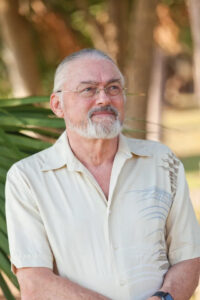That suit is in limbo. What’s next for the New College resistance?
By WSLR News
Original Air Date: Dec. 1, 2023
Host: A federal judge recently declined to block Florida’s controversial new higher-education law. What is the New College alumni organization that funded a lawsuit against the law up to now? The Peace and Justice Report on WSLR asked the group’s chair.
Johannes Werner: In Wednesday’s edition of the Peace and Justice Report on WSLR, host Tom Walker interviewed Jono Miller about NCF Freedom, the New College alumni group formed in response to the hostile takeover of the small university.
Miller, who chairs the organization, described the current status of the lawsuit the group funded against SB 266, a controversial new Florida law that imposes restrictions on public higher education.
Tom Walker: One of your major efforts right now is a lawsuit. Tell us about that lawsuit.

Jono Miller
Jono Miller: That’s right. We were very concerned by Senate Bill 266. This is legislation that contained some of the wording from the Don’t Say Gay Bill, and it seeks to regulate what can be taught. Our position is: We don’t think Floridians want the legislature telling schools what can and cannot be taught. And so, there’s a lot of problematic language in this Senate Bill 266. It works in two separate ways. First, it directly censors the teaching of certain disfavored topics, by prohibiting them outright. But it also denies funding to those institutions that offer courses that include those prohibited topics. And one of our big complaints is that the language is just vague and broad, and it would be hard to interpret. Let me give you some examples. It would be prohibited from instruction which quote, includes unproven speculative or exploratory content.
TW: That’s college.
JM: Well, that’s college, and that’s science, right? Courses based on theories that systemic racism, sexism, oppression, and privilege are inherent in the institutions of the United States and were created to maintain social, political, or economic inequality, inequities. So, you know, where I come from, I believe both women and blacks have been systematically discriminated against. But even if you’re not there yet for whatever reason, let’s look at the American Indian. From 1492 until the present, they have been systematically discriminated against. And they have all these treaties that were contracts they made with the federal government. Imagine what our country would look like if the government suddenly decided to honor the treaties they’d signed.
TW: Oh, we’d be missing part of the country.
JM: We’d be missing a lot of the country. We argued there’s this chilling effect that’s going to limit what people decide to teach. And so, we’ve been trying to do that. We got a hearing in Tallahassee, I drove up there, several others did. We believe the judge would have found that the law was unconstitutional. But he also didn’t think anyone had been directly injured yet. Yet. And so, we failed to get the injunction. And so…you know, we think we’ve fired a shot across their bow and that they’re chastened and maybe no one will be punished for teaching something. But you know, that’s problematic. And as I said, we would hope that a judge could look at a law straight on without anyone being injured and saying this is unconstitutional on the face of it. But that’s not the way the law has been heading lately. …
JW: Later in the interview, asked again by Walker about the SB266 lawsuit, Miller said the group is now looking at filing a more narrowly defined suit in state court.
TW: When do you expect a final ruling on that, or is it sort of in limbo?
JM: I think it’s sort of in limbo. We could appeal the denial of the injunction, but I don’t think that would go very well. I guess another option is to wait and see if someone is called out on the carpet at New College for doing something inappropriate. But instead of waiting around, we are looking into other legal actions. And I can’t talk about them yet. But, in the same vein, dealing with unreasonable restrictions that are being placed on the faculty.
TW: So, you have enough money to bankroll another lawsuit?
JM: Well, I’ll be perfectly honest, we have some money, but there’s the perennial question, can the U.S. fight a war on two continents? We have some money, but we don’t have enough money to do everything we’d like to be able to do legally. And so, if people visit our website, as you said, it’s just ncffreedom.org. They can both read our blog and our mission statement, but also if they’re inclined, figure out how to support us. Let me just say that it’s similar. It’s sort of a different venue. It wouldn’t be a federal challenge, but more of a state law challenge, dealing with some of these problems, inherent in this legislation. So yeah, we’re working on that. And there are other issues. We just can’t do everything. So, we must pick and choose. But yeah, if we had more resources, we could take on more things. But we also have, we’ve been having just sort of informal social events for supporters of New College, people that doesn’t cost anything to join and see a freedom. And so, we’ve done a couple of these events where we just invite people to a local bar or restaurant. People can mingle and chat, but there’s no big agenda. We don’t lecture people or pass plate.
JW: To listen to the full half-hour interview, go to www.wslr.org, click on “archive” and look for the Nov. 29 edition of the Peace and Justice Report.
WSLR News aims to keep the local community informed with our 1/2 hour local news show, quarterly newspaper and social media feeds. The local news broadcast airs on Wednesdays and Fridays at 6pm.